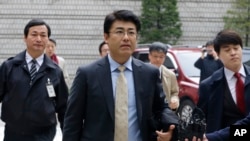In South Korea a Japanese reporter has been indicted on charges of defaming President Park Geun-hye. The case is raising concerns about free speech under harsh anti-defamation laws.
Tatsuya Kato, the former Seoul bureau chief for the Japanese newspaper Sankei Shimbun, pleaded not guilty to the charge of defaming President Park Geun-hye.
The charge stems from an August 3 article he wrote suggesting that President Park was absent for seven hours during the Sewol ferry disaster because she was with a man.
On April 16 over 300 passengers, many of them high school students, died when the Sewol ferry capsized during a voyage to the island of Jeju.
Kato’s article repeated rumors in the South Korean media that the unmarried President Park was romantically involved with a former aide, who was recently divorced, but at the time was also rumored to be married. There is no indication that those other media reports have triggered any legal action.
The Seoul Central District Prosecutor’s office said Kato’s article was based on “false facts.” If convicted, Kato could be sent to prison for up to seven years under the country’s criminal defamation law.
The strong defamation statute along with the national security law that authorizes the government to censor the media were intended to counter North Korean espionage and propaganda.
Oh Chang-ik, with Citizens’ Solidarity for Human Rights in Seoul, said President Park is using the law to protect her image.
This is a symbolic case that shows this country is being controlled by the president and not governed by the law, allowing important national policies and criminal cases to be controlled by the president’s feeling, Oh said.
The indictment comes amid rising tensions between the two countries over competing claims to a chain of uninhabited islands and continued resentment in South Korea over Japan’s militaristic past.
Oh said Kato was not prosecuted because he is Japanese, but it did not help his case either.
He said it was easier to prosecute a Japanese journalist than an American journalist, but does not think this case is related to Korea-Japan relations.
Journalist organizations including Reporters Without Borders have voiced concerns about this case and the possible chilling effect it could have on press freedom in South Korea.
In 2011 Freedom House categorized South Korea as a “partly free” country that actively censors the media, and in 2012 the human rights organization Amnesty International called on the South Korean government to scale back or repeal the national security laws after it documented a dramatic and recent increase of cases that it said involved the government using the law in a “politically motivated attempt to silence debate.”
VOA News Producer in Seoul Youmi Kim contributed to this report.









